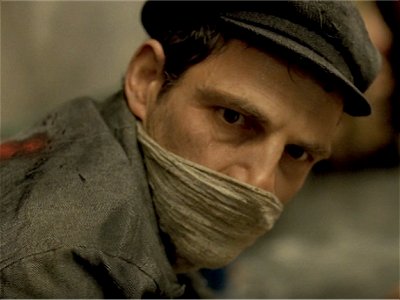
BEARING WITNESS TO THE NIGHT
Stopping pernicious lies about last century may be a defining challenge of this one.
An historical event is most at risk of being denied when there are no more living witnesses to it. We may be approaching this critical moment over the biggest mass atrocity in human history. Holocaust denial is already prevalent, but it might be about to get a lot worse.
Most people remember the incredulity felt when they first learned as young people about Holocaust deniers. The evidence is so complete, so overwhelming, it feels like a pathology to believe otherwise. Living witnesses, sadly, are dying out at the worst possible moment since the events took place. The far right is resurgent across Europe just as political institutions look most vulnerable; some of these groups are trying out sheep’s clothing to hide their identity as wolves, though many do not bother because they do not need to. The digital era has allowed the dissemination of unchallenged lies and its search engines have done little to prevent the worst examples reaching the top line of enquiries. Meanwhile, we are reneging on a duty to be in a relationship with the truth, preferring to take it cool for a while because truth has been a bit too demanding and doesn’t like us flirting with other partners, which is high maintenance of her, all things considered.
We can laugh at the concept of alternative facts when it comes to disputing the size of a crowd, but its application in other contexts can be chilling. Ex-President of Iran, Mahmoud Ahmadinejad, said in office: ‘I will only accept something as truth if I am actually convinced of it’. So, truth is what you think it is; all you need are a few extra manufactured facts. And yet we are not far from this reality only a few years later.
The truth is helped by, and embodied in, storytelling, which shows the duty and the opportunity afforded to creative industries. Jean-Luc Godard said that cinema’s greatest failure has been not showing the Holocaust. One can understand why. Claude Lanzmann, whose epic documentary history of the Holocaust, Shoah, is the production by which all Holocaust stories are judged, has questioned whether dramatic fiction can ever do justice to Auschwitz. No wonder many have been reluctant to try. But one film may have changed this, and it seems Lanzmann agrees.
Son of Saul is a Hungarian film that won both the Grand Prix award at Cannes and Best Foreign Film at the Oscars in 2016. It concentrates exclusively on the experience of a Jewish prisoner, Saul, who has to act as a Sonderkommado, guiding frightened and disorientated captives to their murder in the gas chambers and then removing the bodies and disposing of the ashes. Saul seeks to dignify the murder of a boy he claims is his own, but may only be symbolically, as he tries, in a hellishly constrained way, to bury this young body without the Nazis being aware of it.
The frenetic pace of the film, assisted by its personal focus, gives a demented quality to a place of darkness. He is constantly on the move; sickening scenes happen at the fringes of his eye line. We know what they are – the film itself begins unflinchingly with a crowd being herded into a chamber like it was a big lift at rush hour – but mostly the evil which besets all happens just off screen.
There is only so much one can say about this before one’s own limitations and pretensions are exposed as inadequate to the task, so my recommendation is to watch this film, so it can be recommended to others. The viewer needs to be in a robust frame of mind, but it is not unwatchable and will linger hauntingly in memory, enabling a witness, of a kind.
God forbid that such scenes ever be repeated in Europe again. But if we’re tempted to think most people are simply not gullible or mendacious enough to swallow the lies of Holocaust denial and take refuge in the words of Abraham Lincoln that ‘you can fool all the people some of the time, and some of the people all of the time, but you cannot fool all the people all the time’, European history shows that you only need to fool enough people for periods of time. Stopping pernicious lies about last century may yet be a defining challenge of this one.
POPULAR ARTICLES

Obama's Covert Wars
The use of drones is going to change warfare out of all recognition in the next decades.

Through A Glass Starkly
Images of traumatic incidents caught on mobile phone can be put to remarkable effect.

What Are British Values?
Is there a British identity and if so, what has shaped the values and institutions that form it?


